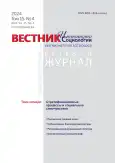Russian Buddhism, Traditional Values, and the Public Media Sphere
- Authors: Ostrovskaya E.A.1, Badmatsyrenov T.B.2
-
Affiliations:
- St. Petersburg State University
- Buryat State University named after D. Banzarov
- Issue: Vol 15, No 4 (2024)
- Pages: 324-344
- Section: Topic of the Issue: Sociology of Religion
- URL: https://journal-vniispk.ru/2221-1616/article/view/278561
- DOI: https://doi.org/10.19181/vis.2024.15.4.16
- EDN: https://elibrary.ru/NYZOXB
- ID: 278561
Cite item
Full Text
Abstract
About the authors
Elena A. Ostrovskaya
St. Petersburg State University
Email: e.ostrovskaya@spbu.ru
ORCID iD: 0000-0003-0664-1514
SPIN-code: 6672-8953
Doctor of Sociological Sciences, Associate Professor, Professor of the Department of Theory and History of Sociology, Saint Petersburg State University, Saint Petersburg, Russia St. Petersburg, Russia
Timur B. Badmatsyrenov
Buryat State University named after D. Banzarov
Email: badmatsyrenovtb@bsu.ru
ORCID iD: 0000-0002-6363-9464
SPIN-code: 5847-4109
Doctor of Sociological Sciences, Associate Professor, Head of the Department of Political Science and Sociology, Banzarov Buryat State University, Ulan-Ude, Russia; Director of the Center for Socio-Political Research ‘Alternative’, Ulan-Ude, Russia Ulan-Ude, Russia
References
- Нестеркин С. П. «Социально вовлеченный буддизм» на Западе // Контекст и рефлексия: философия о мире и человеке. 2017. Т. 6. № 4А. С. 187–193. EDN: YLJUGQ
- Островская Е. А. Российский буддизм в оправе гражданского общества // Двадцать лет религиозной свободы в России / Под ред. А. В. Малашенко, С. Б. Филатова. М.: РОССПЭН, 2009. С. 294–328.
- Островская Е. А., Бадмацыренов Т. Б. Стратегии буддийских сообществ в новых медиа // Социологические исследования. 2022. № 7. С. 109–119. doi: 10.31857/S013216250019277-7; EDN: GPPGQB.
- Узланер Д. А. Постсекулярный поворот. Как мыслить о религии в XXI веке. М.: Ин-т Гайдара, 2020. 416 с.
- Хабермас Ю. Между натурализмом и религией. Философские статьи / Пер. с нем. М. Б. Скуратова. М.: Весь мир, 2011. 336 с.
- Berger J. Religious Nongovernmental Organizations: An Exploratory Analysis // Voluntas: International Journal of Voluntary and Nonprofit Organizations. 2003. Vol. 14. No. 1. P. 15–40. doi: 10.1023/A:1022988804887.
- Berger J. Divine Polity: The Baha'i International Community and the United Nations. PhD thesis. University of Kent, 2018.
- Berger J. Rethinking Religion and Politics in a Plural World. The Bahá’í International Community and the United Nations. N. Y.: Bloomsbury Publishing, 2021. 224 p.
- Ostrovskaya E., Badmatsyrenov T. et al. Russian-Speaking Digital Buddhism: Neither Cyber, nor Sangha // Religions. 2021. No. 12. P. 449. doi: 10.3390/rel12060449; EDN: HKQYDO.
- Ostrovskaya E., Badmatsyrenov T. Monks, Blogs and Three Media Cases: Russian-Speaking Buddhist Communities in the Era of Social Media // Religions 2024. No. 15. P. 1186. doi: 10.3390/rel15101186; EDN: BKZGQV.
Supplementary files










